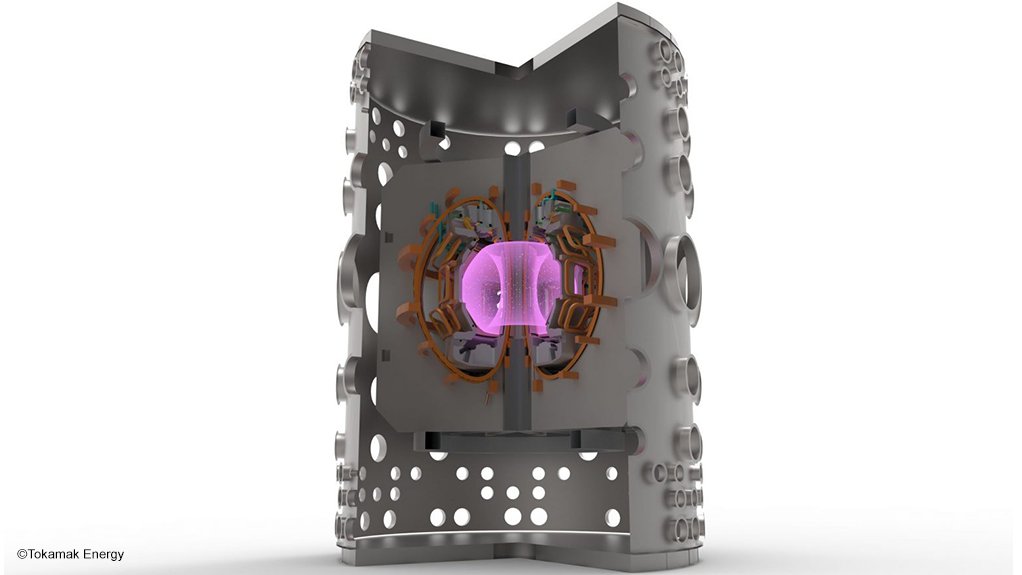UK company to build prototype nuclear fusion energy system on UK government agency site


A cutaway image of the ST80-HTS compact spherical tokamak
Photo by Tokamak Energy
UK nuclear fusion power company Tokamak Energy and the UK Atomic Energy Authority (UKAEA, the government agency responsible for British nuclear fusion energy research and development) have jointly announced that the company is to build its prototype spherical tokamak, designated ST80-HTS, at the UK Fusion Cluster. The UK Fusion Cluster is located on the UKAEA’s Culham Campus, in Oxfordshire, in England. Culham is also the site of the Joint European Torus fusion experiment, which has made major contributions to the development of fusion energy technologies.
The ST80-HTS will be housed in a new, specifically-designed, facility, the design of which is already under way. Completion of this prototype spherical tokamak is scheduled for 2026. Locating it on the UKAEA campus will give the company easy access to top-level capabilities in both science and engineering, and to one of the world’s major concentrations of nuclear fusion design, construction and operating expertise and experience. This decision follows the conclusion of a framework agreement between Tokamak Energy and the UKAEA last October, so that they can more closely cooperate in the development of spherical tokamaks, as a means to achieve commercial fusion energy.
“[This] exciting announcement is a major step forward on our mission to demonstrate grid-ready fusion energy by the early 2030s,” highlights Tokamak Energy CEO Chris Kelsall. “Our next device, ST80-HTS, aims to validate key engineering solutions needed to make commercial fusion a reality and will showcase our world-class magnet technology at scale. It’s clear public and private partnerships of this nature will be a crucial catalyst for fusion to deliver global energy security and mitigate climate change.”
“Our ability to host major facilities extends right across the supply chain from design to decommissioning,” points out UKAEA CEO Professor Sir Ian Chapman. “The announcement is testament to Culham’s attractiveness for fusion development as we welcome Tokamak Energy to the cluster on the Campus.”
Nuclear fusion is what powers the Sun and all other stars. Controlled nuclear fusion involves forcing two light atomic nuclei to merge, forming one heavy nucleus and simultaneously releasing a lot of energy. A tokamak can be conceived of as a big hollow doughnut, entirely encased by extremely powerful electromagnets, with another such electromagnetic system filling the ‘hole’ in the centre of the ‘doughnut’. Atoms of isotopes of hydrogen are stripped of their electrons (by means of an electrical current), forming (positively) charged plasmas. The electromagnets confine and control these plasmas, which are heated to very high temperatures (there are various ways that this can be done), which causes the atomic nuclei to collide, resulting in fusion and energy release. The time that a plasma is held within a tokamak’s electromagnetic field is called a pulse. With fusion, there is no such thing as spent fuel.
A compact spherical tokamak operates in exactly the same way as a standard tokamak, but requires significantly less volume to do so (thus, ‘compact’). Instead of a doughnut shape, think of the shape of an apple which has had its core removed (hence the descriptive term ‘spherical’).
“Tokamak Energy’s ST80-HTS will target the significantly longer pulse durations needed for sustained high power output in commercially competitive fusion power plants,” notes the UKAEA. “It will also inform the design of its ST-E1 fusion pilot plant, which will demonstrate the capability to deliver electricity into the grid in the early 2030s – demonstrating up to 200 MW of net electrical power.”
Article Enquiry
Email Article
Save Article
Feedback
To advertise email advertising@creamermedia.co.za or click here
Press Office
Announcements
What's On
Subscribe to improve your user experience...
Option 1 (equivalent of R125 a month):
Receive a weekly copy of Creamer Media's Engineering News & Mining Weekly magazine
(print copy for those in South Africa and e-magazine for those outside of South Africa)
Receive daily email newsletters
Access to full search results
Access archive of magazine back copies
Access to Projects in Progress
Access to ONE Research Report of your choice in PDF format
Option 2 (equivalent of R375 a month):
All benefits from Option 1
PLUS
Access to Creamer Media's Research Channel Africa for ALL Research Reports, in PDF format, on various industrial and mining sectors
including Electricity; Water; Energy Transition; Hydrogen; Roads, Rail and Ports; Coal; Gold; Platinum; Battery Metals; etc.
Already a subscriber?
Forgotten your password?
Receive weekly copy of Creamer Media's Engineering News & Mining Weekly magazine (print copy for those in South Africa and e-magazine for those outside of South Africa)
➕
Recieve daily email newsletters
➕
Access to full search results
➕
Access archive of magazine back copies
➕
Access to Projects in Progress
➕
Access to ONE Research Report of your choice in PDF format
RESEARCH CHANNEL AFRICA
R4500 (equivalent of R375 a month)
SUBSCRIBEAll benefits from Option 1
➕
Access to Creamer Media's Research Channel Africa for ALL Research Reports on various industrial and mining sectors, in PDF format, including on:
Electricity
➕
Water
➕
Energy Transition
➕
Hydrogen
➕
Roads, Rail and Ports
➕
Coal
➕
Gold
➕
Platinum
➕
Battery Metals
➕
etc.
Receive all benefits from Option 1 or Option 2 delivered to numerous people at your company
➕
Multiple User names and Passwords for simultaneous log-ins
➕
Intranet integration access to all in your organisation



















